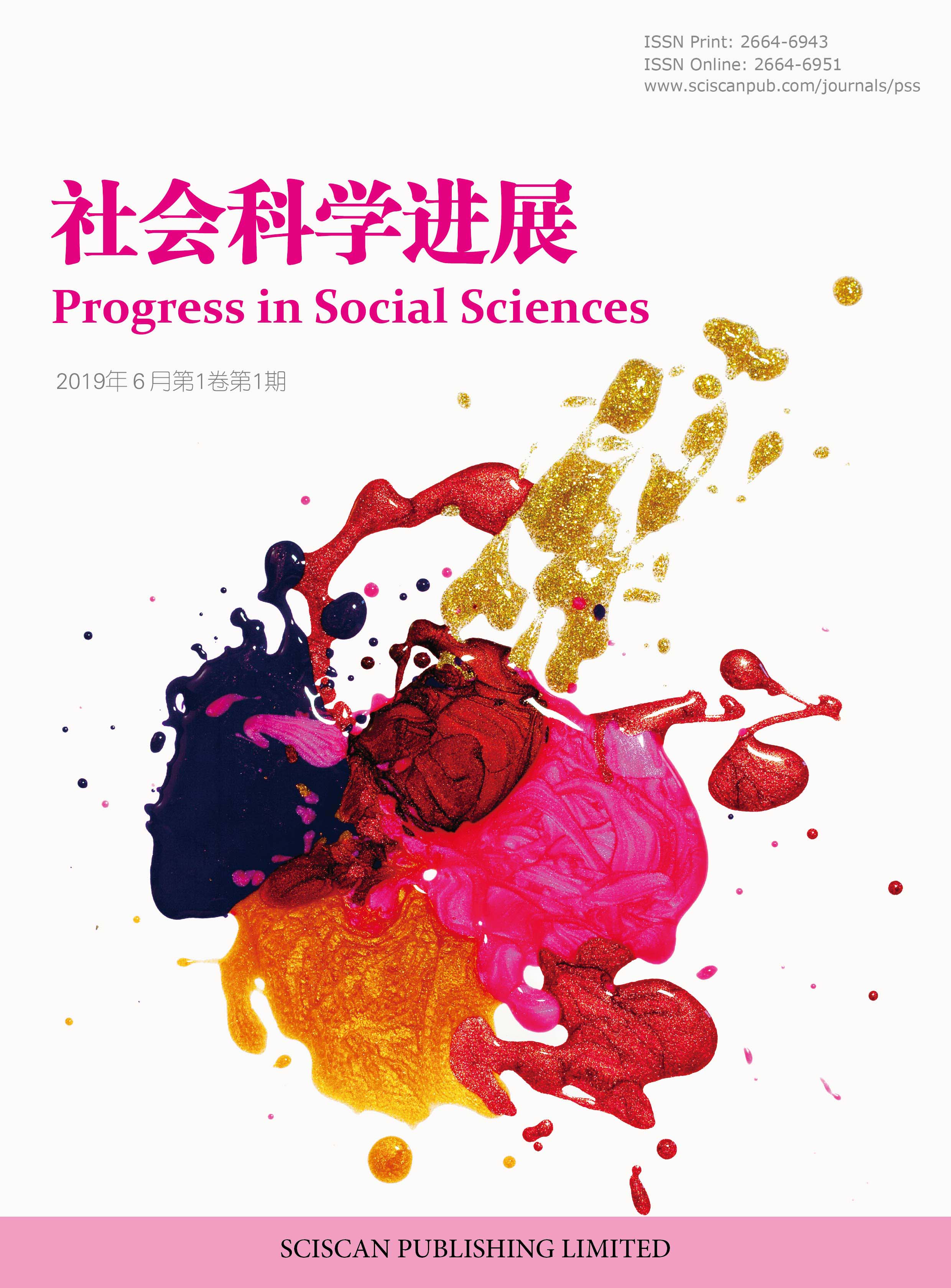Progress in Social Sciences
基于后经典叙事学的电影叙事话语分析——以电影《无人知晓》为例
Narrative Discourse Analysis of Nobody Knows from Perspective of Post-classical Narratology
- Authors: 高蕊 段惠琼
-
Information:
南昌航空大学外国语学院,南昌
-
Keywords:
Narrative discourse analysis; Postclassical narratology; Nobody Knows叙事话语分析; 后经典叙事; 《无人知晓》
- Abstract: Based on post-classical narratology and narrative discourse theory, this paper explores the narrative structure and creative intention of the film Nobody Knows, directed by Hirokazu Koreeda in 2004 from three aspects: narrative time sequence, image symbols and ideology. The article first introduces the development of narratology, distinguishes the difference between classical narratology and post-classical narratology, and points out that post-classical narratology expands the research scope to other media forms. Then, through a specific analysis of Nobody Knows, the implicit social and cultural criticism in the film is revealed. Finally, this paper concludes that a narrative discourse analysis of Nobody Knows helps to gain a deeper understanding of its underlying meaning and implications, providing valuable inspiration for domestic works. 基于后经典叙事学和叙事话语理论,从叙事时序,影像符号和意识形态三个层面探讨是枝裕和于2004年执导的经典电影《无人知晓》的叙事结构和深层含义。文章首先介绍了叙事学的发展历程,区分了经典叙事学与后经典叙事学的区别,指出后经典叙事学将研究范围拓展至其他媒介形式。接着,通过具体分析《无人知晓》,揭示了影片中隐含的社会批判和文化批判。最后,本文总结认为,通过对《无人知晓》的叙事话语分析,可以更好地理解其深层含义,为国内文娱作品创作提供借鉴。
- DOI: https://doi.org/10.35534/pss.0606147
- Cite: 高蕊,段惠琼.基于后经典叙事学的电影叙事话语分析——以电影《无人知晓》为例[J].社会科学进展,2024,6(6):1347-1351.
1 引言
当前,大多数关于电影叙事的研究集中在经典叙事学理论框架内,主要关注文学作品的叙事结构与技巧。虽然这些研究为理解电影叙事提供了基础,但忽略了电影作为一种综合媒介的独特性,特别是在叙事表现形式和话语技巧方面的多样性。相比之下,后经典叙事学理论强调将叙事作品的研究范围从文字拓展至其他媒介形式,如影像、声音等。这种跨媒介的研究视角能够更全面地揭示电影叙事的复杂性和多层次性。
是枝裕和执导的电影《无人知晓》在戛纳电影节上大放异彩,成为一部经典叙事文本。然而,单纯进行主题分析是不够的,有必要将其纳入后经典叙事学的批评话语分析价值体系。通过对《无人知晓》的叙事话语分析,可以更好地理解其深层含义,挖掘其现代商品生产模式的底层逻辑,从而为国内文娱作品创作提供借鉴。本文基于后经典叙事学将叙事研究的范围从文字拓展至其他媒介形式,以叙事话语理论为分析视角,从叙事时序,影像符号和意识形态三个层面探讨《无人知晓》这一现象级的电影作品,挖掘其现代商品生产模式的底层逻辑,冀以给国内文娱作品创作提供些许借鉴。
2 理论背景
从叙事学发展历史阶段来看,叙事学理论可分为两大类:经典叙事学理论和后经典叙事学理论(徐明莺、李正财,2020)。经典叙事学的研究对象是文学作品(张成,2024;张开焱,2023),目的是建构叙事语法和叙事诗学,对文学作品的构成成分、结构、关系和运作规律进行研究。自20世纪90年代以来当代叙事学迎来了一系列新的发展,这些发展被统称为后经典叙事理论,更关注结构特征与作者阐释相互作用的规律。相较于经典叙事学,后经典叙事学的一个重要特征就是将叙事作品的研究范围从文字拓展至其他媒介形式,将研究范围从传统的文字文本叙事拓展至涵盖多种媒介形式的叙事,特别强调结合叙事策略与阐释语境,探讨它们之间的相互作用及对叙事效果的影响。这种多维度互动的叙事分析方法对于当前文化对外传播的研究具有极其重要的意义(刘芳、娄丽景、马志民,2019;张成,2024)。也就是说“只要作品本身含有‘讲述故事’的意义”,不论其表现形式如何,都可成为叙事学的分析对象。电影是综合影像、声音、文字等多种表现方式用以呈现故事的艺术作品,毫无疑问具有“讲述故事”的能力。对于一些经典电影,如《无人知晓》,单纯进行主题分析是不够的,有必要将其纳入叙事学的批评话语分析价值体系。
叙事学研究主要有两个组成部分,一是叙事结构研究,二是叙事话语研究。前者主要关注情节本身,旨在探求故事的内在逻辑与文学结构单元;而后者则更多地关注叙述行为,重点在于叙事作品的各种表现形式和话语技巧。在叙事话语研究中,法国学者热奈特认为“叙事话语”指的是用于叙述故事的口头或笔头的话语,也就是文本(Text)。托多罗夫将“话语”细分为两层:“话语”(文本)和产生它的行为和过程(叙述行为)。而国内叙事学者申丹认为“叙述行为”是“文本”的构成部分。总的来说,叙事话语着眼的是故事的呈现方式,即如何讲故事。凡是涉及故事的讲述方法和表现手法的都可被称之为“叙事话语”。
将后经典叙事学理论作为观照,电影的叙事话语指的是故事本身之外的表现手法,本文将其归纳为两个层面,一是节目最终所呈现出的话语效果,如声音、画面所表现的叙事事件;二是产生这些话语的行为和过程(叙述行为),如各种意象和意识形态隐喻;二者相互融合,不可分割。
3 《无人知晓》的叙事话语分析
3.1 叙事时序
拉波夫区分了叙事文本中存在着两种不同的时序:叙事时序和故事时序。前者是文本展开叙事的先后次序,也就是叙述者讲述故事的时序;而故事时序则是被讲述故事的自然时间顺序,也就是素材本身的发展顺序。故事时序是固定不变的,叙事时序则可以根据叙述者的安排而不断改变。叙事时间便是研究这两种不同时序间关系的一个学术概念,通常包括三个方面:顺序、节奏和频率。拉波夫的事实建构理论还区分了叙述事件和原始事件,叙事事件是指叙事中呈现的事件,而原始事件则指真实发生的事件(即现实),原始事件可以通过叙事证据重构或推断。在是枝裕和的电影中,情节通常被高度淡化,平淡含蓄的表达中总是隐含着大量叙事断点,这就要求观众发动读者自觉,主动区分叙事时序和故事时序,在叙述事件中自行补足原始事件。
在电影《无人知晓》中,存在着文本外的现实和文本内的叙事两个“故事”。文本外是电影的原型,即原始事件:1988年西巢鸭弃养事件。一个名叫惠子的女人在1968年到1986年期间相继与多位情人发生关系,一共生下五个孩子。次男一岁时死于家中,被女人藏尸在柜子里。除了长子明以外,其余孩子都是“黑户”无人知晓。1987年秋天,女人带着四个孩子搬到了西巢鸭的一间公寓里。她隐瞒了其他几个孩子的存在,告诉房东自己仅有长子明一个孩子。半年后女人留下一些钱,抛下孩子去了大阪。她在给长子寄了几次钱后,终于杳无音讯。从此以后,长子明独自一人照顾着妹妹们。又过了半年,长子和社会上结交的不良少年一同把妹妹雪打死,并弃尸野外。一直到1988年五月,房东才以房子被不良少年聚居为由联系警方,这间垃圾堆积成山,散发恶臭的公寓连带着骇人听闻的恶性事件才得见天日。
面对这样的悲剧,作为叙事者的是枝裕和选择用直接叙事的方式,以事件记录者的姿态讲述这个故事。原始事件改编为母亲惠子带着四个孩子一起生活,长子明,长女京子,次子茂,次女雪。在一段温馨的出租屋生活之后,惠子留下一笔钱以工作为借口离开了孩子们。不久之后孩子们经济状况日益拮据,最终不足以解决四个孩子的生存问题以致悲剧发生。而在情节上也做了更加温和的处理,雪的死亡被改成不慎摔倒身亡,明和朋友水口纱希一起用行李箱埋葬了雪。故事的最后,母亲依然没有回来,孩子们也没有被送进少管所或是福利院。孩子们依旧默默从便利店员工手中接过临期食品,只不过雪的位置换成了纱希,继续着无人知晓的生活。
(1)整体顺叙、局部倒叙
影片整体以顺叙为主,穿插倒叙。热奈特把故事时间和叙事时间的不一致称为“时间倒错”,根据方向的不同,可分为“顺叙”和“倒叙”。《无人知晓》在整体上遵循了原始事件发展的内在逻辑和线性时间,采用顺叙的方式,描绘单身母亲惠子带着四个孩子生活,后来抛弃孩子们,以致孩子们最终经济困窘陷入绝境,最大限度地还原了事件的完整性。在局部有穿插部分倒叙,产生“时间倒错”的效果,增加影片张力。是枝裕和时间倒错的把控十分含蓄,这提高了观众的审美参与。如按照叙事时序,影片以地铁中明用脏手摩挲着粉色行李箱这一镜头拉开序幕,接下来镜头便切到搬家的温馨时刻,妹妹雪笑嘻嘻从粉色行李箱中出来。事实上这是是枝裕和刻意进行的时间上的倒错叙事,按照故事时序片头地铁上的粉色行李箱中装的已经是雪的尸体。观众在弄清叙事时序后才能挖掘到原始事件,明白这两个镜头的深意:妹妹雪藏身在箱中来到出租屋,又藏身在箱中离去,她的来处和归路一样“无人知晓”。在这里,叙事顺序既是作品结构又是作品内容,作为叙事接受者的观众不亚于经历一场自我写作,需要对叙事发挥主观能动性才能对作品进行理解。
(2)省略、概要、场景、减缓等四种叙事节奏的运用
叙事发展速度可以分为5种:省略、概要、场景、减缓和停顿,并称之为“节奏”。节奏变化体现了不同故事素材所获取的注意力程度。除停顿在影片中少有涉及外,其他四种叙事节奏都有应用。影片对母亲工作,孩子父亲等辅助元素采取省略的方式。对母亲惠子第一次离开后,四个孩子的生活日常采取了概要处理,影像画面没有直接呈现长子明每一天的活动,而是选取具有代表性的几个镜头。明早上起来给自己倒了一杯牛奶,弟弟妹妹们还在睡梦中;白天,明去便利店买东西,京子在家晾衣服;晚上,明坐在桌子边算账,雪在玩娃娃等。观众可以从这些概要里推断出母亲离开的日子里孩子们的日常。这种概要性的表达方式不仅遵循了事件发展的线性顺序,而且很好把握了事件发展进度。与概要相对的是丰繁处理,即减缓。
片中有两个被夸张地放慢甚至停驻的时间。一个是明带着妹妹雪去接妈妈,回来的路上看到了奔驰的列车。当明说完“将来我一定要带小雪坐火车去看飞机”后,画面中就中剩下哥哥的脸和列车长长的灯光。那灯光仿佛一条巨大的虫,从各个方向不断地驶来,一次又一次照亮了男孩子的脸。这是梦想存在于现实中的时刻。这时候的孩子虽然孤独,虽然察觉到母亲的疏离,但他们仍然在等待母亲的归来。家庭还没有解体,所以生活还足以承担一个美好的梦想。这个梦想来来回回,萦绕在男孩的心里,照亮他的困苦。他决心要抓住这个梦想,在他憧憬的时候,时间变慢了,列车一次次地从远方驶来,在黑夜中代表着光明和希望。另一个停止的时间是明在街上狂奔。拒绝了纱希援助交际得来的钱后,他第一次在街上像一个成年人一样狂奔——虽然他早已经被当作一个大人一样活着。这是梦想正面撞击现实的时刻,结果是梦想碎了。街上熙熙攘攘,但奔跑的脚步声在各种噪音中格外清晰,一下一下敲打着这个世界,似乎在控诉,似乎在哭泣,那一段奔跑似乎没有尽头。这种减缓性的表达方式会放大细节,深化观众审美体验。当减缓与概要交替出现时,整个叙事节奏会变得繁简有节,张弛有度。场景是对故事的还原性记录,电影里一年半的时间变化是真是发生的,镜头与镜头之间,被剪辑省略的时间,是真实存在的。影片里有一年半的时间变化,但是枝裕和没有特意强调时间的流逝,而是用周围环境的变化表达四季更迭,如孩子们逐渐变长的头发,逐渐破旧的衣物,明一次次的数钱,阳台逐渐变多的泡面,桌面越来越多的水电通知单,小雪画画的蜡笔从全新只剩一个笔尖等。是枝裕和认为真正的成长才能呈现最真实的观感,他试图使观众相信银幕上发生的一切,不是编造的故事,而是真实存在于某一个世界里的。一系列叙事节奏的应用使观众让观众进入到这个电影世界,相信叙事时间和故事时间是同步整一的。
(3)声音和画面
这部电影罕有地缺少音乐,如同孩子们的生活中没有音乐——一如长女京子那架小钢琴,对这些无人知晓的孩子们而言,音乐是奢侈。不过但凡出现音乐,都是欢快的。第一个长段的音乐出现在孩子们平生第一次一起携手出门。妈妈已经不知所踪,但步出牢笼的孩子却尽情享受着前所未有的舒畅和欢欣。这是生命力的一次集中的闪光。此前或此后,生命力的光芒都没有这么耀眼和蓬勃了。
就画面而言,叙事画面可分为语言符号和非语言符号,前者包括字幕等文字形式,此外都属非语言符号。影片画面最有特色的就是运用事物细节来展现时间变化。没有任何言语,只有一些默默变化的客观现象在提醒我们:时间流逝了,比如逐渐蓬乱的头发,消磨掉的粉笔头,残褪的指甲油,破损的钢琴,肮脏的衣服。时间以这种方式流逝又提示了故事的走向:不再天真、危机四伏的兄妹关系,行将垮塌的脆弱的家,逐渐沦为乞丐的无可避免的结局。这些沉默的细节犹如咒语,让所有的天真和片刻的快乐更加疼痛。但面对这些不详的谶语,导演的镜头如此平静,将这股疼痛和唏嘘抽成不易察觉的细丝,缓缓地缠上观众的心。
3.2 影像符号
以艾柯、沃伦为代表的主要着眼于电影影像符号学的“影像符号编码说”认为电影影像并非现实物象的纪录和复制,而是强调电影语言作为文化符号的性质。换言之,人们更应当关注电影中具有所指意义的能指符号。如影片中反复出现的指甲油,蜡笔、钱、箱子和衣柜等就是有意义的影像符号。在影片开始,一日晚归,惠子兴致很高,给京子涂上了自己的指甲油。父亲据说是音乐制作人,渴望弹钢琴的京子,有一双白皙修长的手,鲜红的指甲油使那双手更加美丽。这里的红色指甲油象征着幸福,温暖和对未来的期待。次日,惠子第一次离家,约有一个月的时间。影片并没有从对白中透露确切的时间,只是特写了京子的手,指甲油即将脱落殆尽。京子手上的指甲油从鲜红到褪色,暗示母亲已经很久没有回家了。而在惠子离家一个月后,京子不慎将指甲油打翻在地,遭到惠子的责备。此处设计传达京子对母亲的依恋,并且暗示惠子再次离开,就同打翻的指甲油一样再回不来。
又如行李箱、影片有两个极具代表性的有关行李箱的镜头:一个在影片的开始,电车厢内,明和纱希对坐着,满身狼狈,中间放着一个粉红色箱子,车轮滚动,四周人声嘈杂,色调阴暗,氛围压迫;第二个镜头紧随其后,母亲惠子一家人搬家,一样的粉红色箱子出现在画面中,里面钻出弟弟茂和妹妹雪。这两个镜头中,箱子都具有运输和藏身的使用功能,但与此同时,箱子代表的封闭空间同时具有表意功能,隐喻孩子们的生存空间。一方面,作为运输和装载物品的工具,电影中的行李箱却变成了运输人的工具,暗指几个“黑孩子”没有作为人的社会属性。既然是“非人”,那无人在意,无人知晓似乎也顺理成章。另一方面,结合事件原型,惠子的第三子死后就是被藏匿于壁橱中,壁橱这一封闭的储物空间变成了死亡空间。影片中幺女雪死后被装载在行李箱中,这意味着雪直至死后都没能找回人的属性。而明和纱希埋葬雪时,行李箱变成了棺材,箱子原有的使用功能被结构,有了死亡意指。
3.3 意识形态
叙事学从经典到后经典的转向过程中,意识形态是绕不开的话题。如果说经典叙事学旨在描述叙事作品的共性叙事结构,属于形式主义的范畴;那么随着后经典叙事学引入后结构主义和解构主义,叙事学开始有了“反形式主义”的倾向。后经典叙事学不再将叙事作品视为独立自主的文本存在,而是将其视为历史文化语境中的产物,其研究关注叙事与性别、文化、社会、读者意识、意识形态作品与创作语境之间的相互关系。换言之,可以通过研究叙事话语揭示语言中蕴含的意识形态和批判关系。
对人们生存境况的关注是影片表达的重中之重,这与20世纪八九十年代日本社会背景息息相关。1985—1990年,泡沫经济破裂,经济增速放缓,社会发展红利消失,社会问题随之暴露;政治上受新自由主义影响进入“第二战败期”,平成大萧条到来。影片中人们冷漠、颓废、焦虑、孤独和绝望映射的正是失业、老龄化、低收入、生存压力骤增、自杀率与犯罪率节节攀升的残酷现实。1988年西巢鸭弃养事件给大学刚毕业的是枝裕和极大震撼,15年后他将电影作为其诉说意识形态的载体,重新讲述了这个残酷的故事,隐晦地向社会发声。
如片中暗指惠子的职业可能与风俗产业相关。纱希为了筹钱给明,去KTV陪老男人唱歌的情节或指现实中的未成年人援交。由于经济实在困窘,明不得不向弟弟妹妹们的疑似生父寻求帮助,但每个男人都会控诉经济不景气、低收入、生活压力巨大,显得猥琐又自私;明的活动场所不大,街区众人却都对这个孩子显而易见的无法上学,缺衣少食,日益“野化”视若无睹。房东来收租时,也发现无人看管的孩子与屋内的一片狼藉表现出一阵错愕;而错愕之后,房东只是拍着怀里的狗转身离开,好像自己没有看到这一切;明对帮助过他的便利店员工表示宁愿继续四人艰难生活也不愿意去儿童福利机构,映射当时政府等权威机构失灵、人们经历信仰危机、情色业发达、失业率攀升、疏离社会、信仰崩塌、梦想缺失。电影用孩子的视角展现着整个国家的现状,暗含他对日本社会问题的批判和担忧,这种自我反省和批判让这部电影格外发人深省。
4 结语
《无人知晓》毫无疑问是一部佳作。从叙事话语分析的角度来看,对原始素材的适当增减改编,详略得当的叙事节奏无疑是画面呈现如此精彩的关键要素。此外,影片基于对真实事件的改编,通过纪录片式的镜头叙事和细致的影像符号,隐晦表达了导演的意识形态诉求,以期唤起大众对底层人民的关注,关注疏离社会,避免悲剧再现。
参考文献
[1]John PIER,龙娟.关于经典叙事学和后经典叙事学的若干思考[J].外语与外语教学,2012(1):81-85.
[2]陈晓云.动画电影:叙事与意识形态[J].上海大学学报(社会科学版),2010,17(5):54-60.
[3]杨先顺,张山竞.论叙事话语分析作为广告批评路径的背景、意义和问题[J].暨南学报(哲学社会科学版),2009,31(6):185-189,212.
[4]宋家玲.论电影叙事之当代生存状态[J].解放军艺术学院学报,2004(1):14-22.
[5]李显杰.当代叙事学与电影叙事理论[J].华中师范大学学报(人文社会科学版),1999(6):18-28.
[6]徐明莺,李正财.身份认同:索尔·贝娄《赫索格》中的叙事伦理[J].外语教学,2020,41(1):109-112.
[7]刘芳,娄丽景,马志民.媒介融合与文化叙事策略创新——兼论立体的文化育人平台建设[J].中国教育学刊,2019(S1):4-6.
[8]张成.互动叙事的两面性——电子游戏叙事中的作者复归[J].上海大学学报(社会科学版),2024,41(2):67-79.
[9]张开焱.照着说接着说对着说说自己的——中国叙事学的创新发展路径浅谈[J].甘肃社会科学,2023(1):80-92.
















